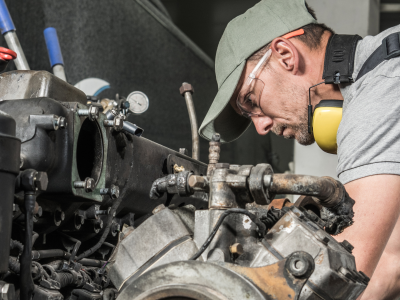Mechanic: Heavy Duty & Automotive Assistant Training Program

What does a Heavy Duty & Automotive Assistant do?
A Heavy Duty & Automotive Assistant supports the maintenance and repair of heavy-duty vehicles. They assist mechanics with tasks like vehicle inspections, cleaning tools, and preparing work areas. These professionals contribute to a smooth workflow by ensuring equipment is organized and safety protocols are followed. Their role is vital in enhancing the overall efficiency of automotive repair teams.
What does the Mechanic: Heavy Duty & Automotive Assistant program include?
The Mechanic: Heavy Duty & Automotive Assistant program is a comprehensive 9-week course designed to provide a thorough understanding of automotive and heavy-duty mechanics. The program covers essential aspects such as workshop safety practices, the correct use of common mechanic tools, and the identification of various machinery, including lifts and diagnostic equipment. Participants will delve into brake systems, gaining insights into different types and mastering maintenance, repair, and replacement techniques. The curriculum extends to engine operations, encompassing gasoline, diesel, and hybrid systems, with a focus on basic diagnostics, maintenance, and repair. Transmission systems, both manual and automatic, are explored in detail, along with electrical and ignition systems, covering batteries, starters, alternators, and ignition diagnostics and repair. The course also includes instruction on climate control and exhaust systems, addressing heating, air conditioning, exhaust, and emission requirements. Practical training involves hands-on exercises in a workshop setting, allowing participants to apply diagnostics, maintenance, and repair techniques under supervision. The program concludes with certification preparation and discussions on various career opportunities in mechanic work, including private garages and fleet maintenance.
Course Modules Outline:
• Overview of automotive and heavy-duty mechanics.
• Workshop safety practices, personal protective equipment (PPE).
• Identification and correct use of common mechanic tools.
• Introduction to mechanic machinery, including lifts and diagnostic machines.
• Overview of different brake systems.
• Maintenance, repair, and replacement techniques for brakes.
• Understanding the fundamentals of engine operations: gasoline, diesel, hybrids.
• Basic engine diagnostics, maintenance, and repair.
• Overview of manual and automatic transmissions.
• Maintenance, repair, and diagnostics for transmission systems.
• Basics of automotive electrical systems, including batteries, starters, alternators.
• Diagnostics and repair of ignition systems.
• Maintenance and repair of heating/air conditioning systems.
• Understanding exhaust systems and emission requirements.
• Hands-on exercises under supervision in a workshop setting.
• Diagnostics, maintenance, and repair techniques.
• Review learning materials, cover additional topics as needed.
• Discuss career opportunities in mechanic work (private garages, fleet maintenance, etc.).

